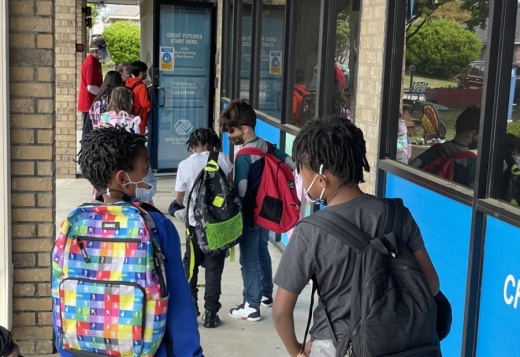Competition with private companies and a relatively long training and licensing process for commercial drivers are contributing to the shortage. Not having enough drivers can cause delays, MISD Chief Accountability Officer Geoff Sanderson said. Or it could result in services stopping altogether, like with the Boys & Girls Clubs of Collin County, which had to temporarily cease student pickups from six McKinney schools.
“Not having a pool of drivers available also has affected the growth of our organization, as we are unable to access more areas to bring more members into the clubs,” Boys & Girls Club CEO Marianne Radley said in an email.
Stopping services
Boys & Girls Clubs run an after-school program with character and leadership development, life skills and recreation opportunities for children ages 5-18. The McKinney club is located on Church Street near Finch Park.
Drivers for the clubs would pick registered children up from their schools and drop them off at the clubs. For many students, this is the only way they have access to the programs the clubs provide, Radley said.
The clubs had to cut back student pickups for two reasons. The first was that many bus drivers left the club as other companies began recruiting more during the COVID-19 pandemic. The second was that since the pandemic, student membership declined by about 62%, Radley said. It is not feasible to send the clubs’ few drivers out to pick up only one or two students at these schools, she said.
The clubs currently have two bus drivers to divide between the three club locations in Collin County. About 22% of the clubs’ overall membership decline is attributed to no longer being able to pick up at schools across the county, not just MISD, Radley said. The clubs had to stop pickups at 15 Frisco ISD schools and eight Plano ISD schools.
If the club gets more drivers and memberships pick back up, the club can resume services to those schools it had to stop picking up from, she said.
“Our focus is to serve more kids more often and allow the youth of Collin County access to the after-school resources and services that the Boys & Girls Clubs of Collin County provides,” Radley said in her email.
The clubs provide homework and college preparation help, which more students especially need after the pandemic affected education, Radley said.
One national study of 5 million students by the Northwest Evaluation Association projected the combination of a typical “summer slide” in learning and the disruption to schooling due to COVID-19 could cause regression for some students.
“These kids that we’re talking about are already one to two years behind in education because of the pandemic,” Radley said.
The school year is almost over, but the driver shortage could carry over to summer camp offerings too, Radley said. The Boys & Girls Clubs need drivers to take children to field trips. Without drivers, those activities would have to be curtailed, she said.
Retirees are often good fits for club drivers, Radley said, since they have the flexibility to work the part-time, afternoon schedule.
“We want them to have a happy and joyful disposition,” she said. “Our club kids are really good kids.”
Kareem Evans has been bus driving for the clubs for the last 10 years and called the experience “rewarding.” He said during this time he’s seen the kids go off to college and gone to their weddings.
“[Driving] is a foundational piece,” he said. “We’re giving these kids an opportunity to get to the Boys & Girls Club so they can learn and have these fun things, and that wouldn’t happen if they couldn’t get to the club. And that starts with the drivers.”
Having just seven more drivers for the Boys & Girls Clubs would make a significant difference, Radley said.
“The fact that we don’t have drivers is something that a year ago, none of us would ever have thought about impacting our business, and it’s having an incredible impact,” she said. “It would be so much easier if we had these drivers.”
McKinney ISD needs
The transportation needs do not stop with the local nonprofit. About 30 to 40 more bus drivers are needed at McKinney ISD for the next school year, Sanderson said.
One of the major challenges for attracting school bus drivers is the part-time, split work schedule, Sanderson said. Drivers typically drive a morning route and an afternoon route with a break in the middle of the day.

“It has been a challenge, to the point where our provider has actually brought in drivers from out of region, out of state, to try to plug gaps and fill to be able to maintain continuous operations,” Sanderson said.
MISD does not have its own bus fleet. Instead, it partners with Durham School Services to transport students using 155 buses with 84 regular routes, according to the district website. This means that any driver shortages would have to be filled by Durham, Sanderson said.
“It’s actually much more costly to them,” he said. “Because they’re having to honor the contract, they’re bringing in those folks and are also having to house them ... while they’re here, until they’re able to find those positions to get them filled.”
The district has route software with printable sheets for all bus drivers to know what their stops are and how many registered students can be at that stop, Sanderson said. But new drivers or drivers who are stepping in to fill a shortage will probably be slower, and there might be delays, he said.
“Bus drivers, in general, is always an area that we are continuously trying to recruit,” he said.
Training drivers
Training and licensing are also challenges when seeking drivers, Sanderson said. Durham provides paid training so MISD drivers can get their commercial license and be ready in time for the start of the school year.
“There is an onboarding process that can be provided for any applicant who does not have that license,” he said.
Collin College also offers commercial driver’s license training through a third-party vendor, R&B Vocational Training, to help meet the local need for drivers. The courses run for about four weeks, and students need to complete 200 hours of training to earn a Class A commercial driver’s license, which exceeds the Class B license needed to drive a school bus, a college spokesperson said.
Bryce Walker, one of the instructors for the commercial driver’s license course, said students are able to take their state tests to receive their licenses through the college. Going to a Texas Department of Public Safety office can sometimes result in a three- to four-month wait for a testing spot, he said.
The test is not easy, Walker said. On the state level, about 30% of people pass the first time, he said, which results in rescheduling and testing being backed up even more.
He said students who finish the course and get their commercial driver’s license can be placed in a job the week after class if they desire.
“We have about four or five different recruiters come in from different companies that are hiring straight out of our school,” Walker said.
The companies that Walker works with outsource about half of their contracts because they do not have enough drivers, he said. However, he is seeing more students take classes than in years past.
“A lot of jobs are gone, but truck driving, it’s still there, and there’s still high demand for it,” Walker said.
Drivers needed
Those who are interested in filling bus driver roles at McKinney ISD can call 469-628-6057 or visit www.durhamschoolservices.com/career.
Bus drivers applying for the Boys & Girls Clubs of Collin County can visit www.bgccc.org/about-us/careers.
More information about the commercial driver’s license classes offered at Collin College is available at www.collin.edu/ce/classes/truckdriving.html.





